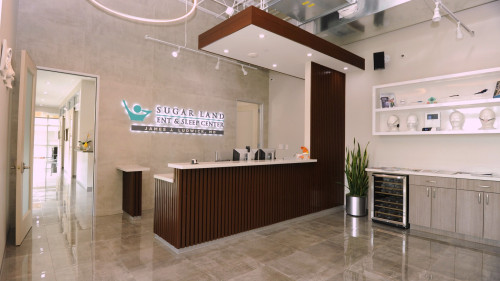Obstructive Sleep Apnea
When it comes to treating snoring and sleep apnea, there is only one board-certified Otolaryngologist in Texas who is also fellowship trained and board-certified in Sleep Medicine. With over 20 years of diagnostic sleep testing, CPAP management, oral appliance therapy, and sleep and nasal surgery experience, Dr. Ludwick is uniquely situated to help patients successfully treat their snoring and sleep apnea.
-
 Palate Surgery
Palate Surgery
-
 Tonsillectomy (Tonsils Removal Surgery)
Tonsillectomy (Tonsils Removal Surgery)
-
 Tongue Base Reduction
Tongue Base Reduction
-
 Hyoid Suspension
Hyoid Suspension
 Hyoid Suspension
Hyoid SuspensionIf the epiglottis and/or lateral wall of the upper airway contributes to obstructive events that occur during sleep, a tethering suture may be placed around the hyoid bone pulling it up and forward in the neck. This helps bring the epiglottis forward and can provide some tension to the lateral walls of the airway. This procedure is seldom performed in isolation and is typically combined with a tongue base procedure.
-
 Inspire Neurostimulator Surgery
Inspire Neurostimulator Surgery
 Inspire Neurostimulator Surgery
Inspire Neurostimulator SurgeryNeurostimulation of the tongue is provided by a small, implantable nerve stimulator. When the device detects an inspiration, it sends a small pulse of electricity to the motor nerve of the tongue, causing the tongue to move forward opening the upper airway and reducing the number of Obstructive Sleep Apnea events.
-
 CPAP Treatment
CPAP Treatment
 CPAP Treatment
CPAP TreatmentContinuous Positive Airway Pressure (“CPAP”) therapy prevents the collapse of the upper airway during sleep by maintaining a positive pressure of air in the upper airway. This therapy is highly effective and it is considered the gold standard to which all other Obstructive Sleep Apnea treatments are compared.
-
 Oral Appliance Therapy (OAT)
Oral Appliance Therapy (OAT)
 Oral Appliance Therapy (OAT)
Oral Appliance Therapy (OAT)We provide custom fabricated Oral Appliances for the treatment of snoring and Obstructive Sleep Apnea. In select patients, Oral Appliances, alone or in combination with sleep apnea procedures, can replace CPAP therapy as an effective treatment option for patients suffering with OSAS.
-
 Consultation
Consultation
 Consultation
ConsultationWe are committed to providing our patients with consultations that are educational and informative. Dr. Ludwick reviews all exam findings and photos with his patients and then provides a recommended treatment plan based on those findings. This transparent approach to care allows our patients to choose the treatment option that is best for them.
-
 In-Office Upper Airway Endoscopy
In-Office Upper Airway Endoscopy
 In-Office Upper Airway Endoscopy
In-Office Upper Airway EndoscopySleep testing tells patients whether or not they suffer from obstructive sleep apnea but it does not tell us why you are having obstructive sleep apnea events. A painless, in-office upper airway endoscopic exam, along with a traditional nose and throat exam, helps us understand what is causing you to snore or have obstructive sleep events and how to correct it! These exams are photo-documented and the images are reviewed with our patients.
-
 In-Home Sleep Testing
In-Home Sleep Testing
-
 Drug-Induced Sleep Endoscopy (DISE)
Drug-Induced Sleep Endoscopy (DISE)
 Drug-Induced Sleep Endoscopy (DISE)
Drug-Induced Sleep Endoscopy (DISE)We offer Drug-Induced Sleep Endoscopy (“DISE”), the most accurate way to determine the cause of your Obstructive Sleep Apnea. Performed in an office or facility setting, patients undergo a short sedation while Dr. Ludwick examines their upper airway. The exam reveals where and how the patient’s upper airway is obstructing, helping Dr. Ludwick design tailored treatments for his patients.
Call (209) 362-3311 now, or complete this form and our office will contact you within the next business day.


